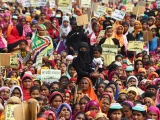
Darker Agenda behind U.S.-India Security Partnership
October 22, 2024Senator Marco Rubio’s introduction of the “U.S.-India Defense Cooperation Act” on July 25, 2024, is a glaring example of geopolitical hypocrisy. This bill aims to strengthen defense ties between the U.S. and India, citing threats from China and the need for military collaboration. However, its true motivations reveal a much darker agenda.
The bill purports to support India’s territorial integrity and proposes increased military cooperation. Yet, it conveniently sidesteps critical issues, such as India’s human rights abuses in Indian illegally occupied Jammu & Kashmir (IIOJK). This glaring omission suggests that U.S. policymakers prioritize economic interests over genuine democratic values.
Under this act, India gains a limited exemption from CAATSA sanctions, allowing it to purchase Russian military equipment. This move not only contradicts U.S. efforts to isolate Russia but also showcases a troubling double standard. While the U.S. harshly criticizes other nations for similar actions, it turns a blind eye to India’s strategic choices.
India has long used the specter of terrorism to deflect scrutiny of its own actions in IIOJK. The Indian government frequently blames Pakistan for cross-border terrorism, framing its brutal occupation of Kashmir as a legitimate security measure. This narrative is not just misleading; it’s a calculated distraction from the ongoing struggle of Kashmiris for self-determination.
International law recognizes self-determination as a fundamental right, yet Kashmiris have been denied a plebiscite promised by UN resolutions. The U.S., instead of advocating for these rights, has chosen to align with India, thereby endorsing its colonial-like control over the region.
Moreover, the hypocrisy extends to broader U.S.-India relations. Both nations profess commitment to democracy and human rights while simultaneously engaging in realpolitik. The U.S. historically supports authoritarian regimes when it serves its interests, conveniently overlooking India’s human rights violations.
India’s internal policies, especially regarding IIOJK, highlight this contradiction. The abrogation of Article 370 and subsequent restrictions on civil liberties have drawn international condemnation, yet the U.S. remains largely silent. This lack of accountability starkly contrasts the values both nations claim to champion.
The economic relationship between the U.S. and India further complicates matters. While they preach free trade, protectionist measures reveal their true colors. Tariffs and restrictions on foreign companies highlight the hypocrisy underpinning their partnership.
India’s stance on the Russia-Ukraine conflict exemplifies this duplicity. It claims neutrality while maintaining strong ties with Russia, further complicating its relationship with the U.S. This opportunism raises doubts about India’s reliability as a defense partner.
In multilateral forums, India seeks to position itself as a leader of the Global South. However, its increasing alignment with U.S. interests undermines this claim, exposing a fundamental conflict between its self-image and reality.
The U.S.-India partnership, cloaked in shared democratic ideals, is little more than a façade. The emphasis on strategic pragmatism over genuine human rights advocacy reveals the self-serving nature of both nations. In their pursuit of power and influence, the suffering of people—particularly Kashmiris—remains tragically ignored.

